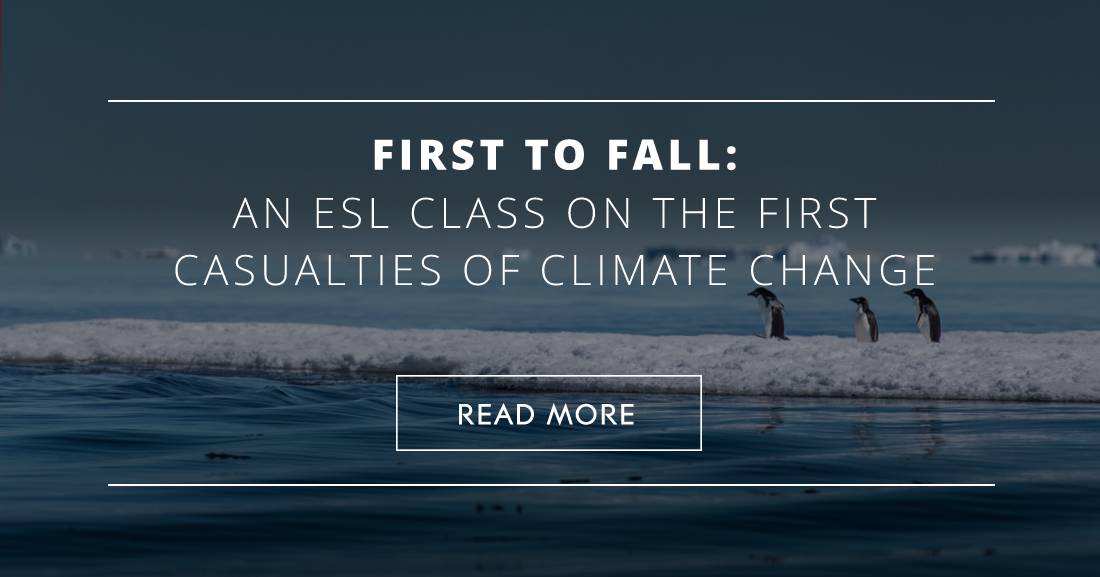
One of the most beautiful places in the world is a little island group you may never have heard of.
Kiribati is a group of 34 islands and reefs, populated by around 100,000 people. It islands are the stuff of postcards and daydreams: white sand beaches, swaying palm trees, endless sunshine and inviting, tropical waters. The islands’ culture is vibrant, with long and important traditions of music and dance. They speak Gilbertese, a language used nowhere else, and have been welcoming visitors with a disarming, easy charm for centuries.
But, by 2050, Kiribati will have entirely disappeared under the waves.
3 Stages of an ESL Class on the First Casualties of Climate Change
-
1
Setting Up and Eliciting
I brainstormed for some time, and ended up with what I felt was a terrific way to begin the class: a quote from then-President of Kiribati, Anote Tong:
“To plan for the day when you no longer have a country is indeed painful, but I think we have to do that.”
It took no time at all for my students to latch onto the topic area, particularly once I’d helped them find tiny, remote Kiribati on our big wall map. I simply asked, “Why is his country in danger?” and this began our discussion of the first casualties of climate change. The important target language emerged immediately, so I checked and drilled the important elements:
Climate change, global warming, sea level rise, desertification, acidification, deforestation, habitat loss, coral bleaching, flooding.
-
2
Initial Practice: Quick Research
Twenty years ago, an ESL teacher with my remit might well have pulled a few books from the library and prepared a short presentation on the topic in question. These days, with Wi-Fi in every classroom and a high-powered tablet or phone in almost every student’s bag, we can take a different approach. Delegating like this shifts to my students the responsibility for reading and summarizing, two key skills which are often our focus.
I asked my students to research cases where a country or area is directly and immediately threatened by climate change. I offered some hints, encouraging them to focus on Syria, Bangladesh and Miami. Within twenty minutes, and with only a little help from me, I received the following summaries:
- Climate change caused a massive drought in Syria which compounded the dislocating effects of the civil war and created millions of refugees
- Bangladesh has already lost a little island in the Bay of Bengal, and is so low-lying that any sea level rise will have disastrous results. Perhaps 20 million people will become climate refugees.
- Miami stands on the front line of climate change; the irony that Florida (a state of gleeful mass consumerism and enormous pick-up trucks) will shortly face the most expensive effects of climate change wasn’t lost on my students. One young lady wondered if President Trump’s climate change policies might be influenced by seasonal flooding of his exclusive Mar El Largo resort.
-
3
Free Practice: Discussions, Debates and Writing
Climate Change offers endless opportunities for language practice. My students were passionately interested in the topic, and all brought experiences and opinions to the table, so all I needed to add was vocabulary and a review of some future-related structures, as we were doing plenty of predicting. Here are some good possibilities for follow-up exercises:
- A Cable News Show. I helped to set this up, but my students knew the format already. Organized in the format of a ‘special report’ similar to BBC’s Newsnight, my students took the roles of anchor, correspondent, interviewees and scientific experts, and produced a well planned and rehearsed 12-minute news segment focusing on Kiribati. My favorite part was when the joker of the class tried to affect a Polynesian accent while playing the role of Kiribati’s president; hilarity ensued.
- Debate: Should the World Help Kiribati? It’s rather heartless to cast Kiribati as a ‘hopeless case’, but the world seems to have decided that these islands are doomed. I divided my students into two groups and helped them prepare talking points on both sides of the argument. One portrayed this as a natural result of global development; the Gilbertese were sadly obliged to pay the price for our increased wealth and security. The other side campaigned for immediate sanctions against countries who refused to sign the Paris Accords, as well as the donating of nearby land by Australia and others to help re-house the inevitable climate refugees.
- The Diary of … This is as flexible as your imagination. One student wrote excerpts from the diary of a climate researcher, and another wrote from the point of view of a Kiribati citizen caught up in the chaos of climate change.
- An Alien’s Eye View. To encourage my students to see the bigger picture, I offered this topic and invited the students to get creative. An alien, one student argued, would immediately be able to trace and explain the effects of climate change, because they were met and overcome by his home culture. What would they make of our collective efforts? Would they perhaps chose to intervene and help us, or is solving problems of this magnitude the hallmark of a truly advanced civilization?
- Policy Papers. I asked my students to design a new environmental policy for their country, or the US, intended to tackle the worst results of climate change. Plenty of great ideas came up, including the Tobin Tax (a tiny levy on every stock trade and currency transaction, the proceeds of which could be directed to combating climate change) and very strict policies on urban car use. There were also ideas for promoting the use of public transport, and the development of fusion power, which may replace fossil fuels some time in the present century.
My students needed no lecture from me to conclude that climate change is real, and has already begun to affect people’s lives.
We did briefly consider how some people have yet to reach this same view, and most of my students blamed corruption or poor education. Our focus, though, was on the present-day reality of climate change and the people who are now certain to lose their ancestral homes, farms and perhaps cultures as the waters inexorably rise. Bringing home the reality of these changes was in many ways the point of the class, but it was also a great opportunity to expand vocabulary and work on fluency, using a topic with which my students were already very familiar.
P.S. If you enjoyed this article, please help spread it by clicking one of those sharing buttons below. And if you are interested in more, you should follow our Facebook page where we share more about creative, non-boring ways to teach English.








